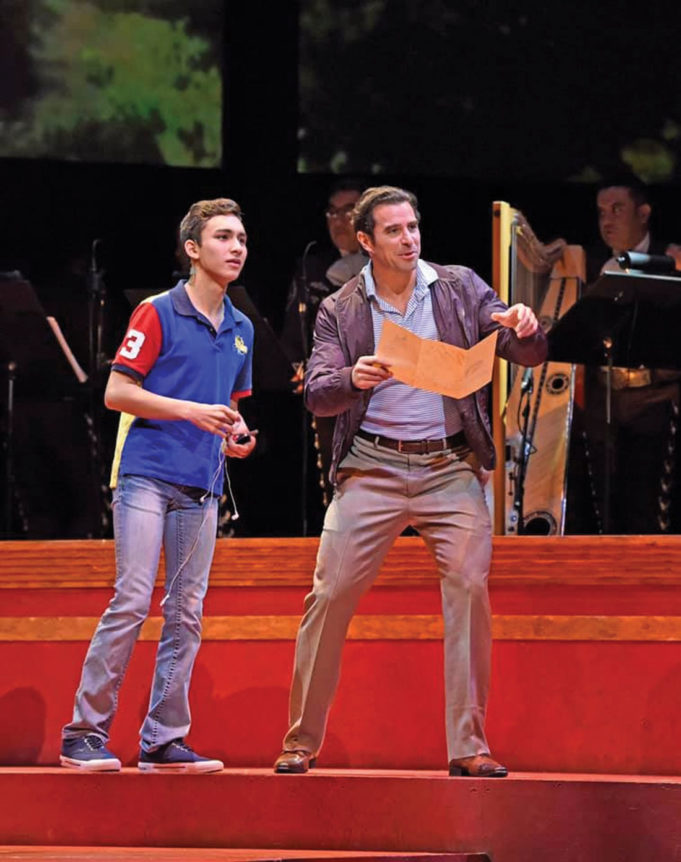This year’s Fort Worth Opera Festival concluded with a Mexican-themed work, fulfilling a pledge by former FWO general director Darren Woods to include Spanish-language operas in the company’s annual festivals through 2020.
El Pasado Nunca Se Termina (which translates to “the past is never finished”) is largely set in 1910 Mexico. The staging at Bass Performance Hall was sparse. The virtuosic Mexican ensemble Mariachi Nuevo Tecalitlán provided music and some colorful interactions with the actors throughout the hour-and-a-half operetta. El Pasado Nunca Se Termina opens with Amorita (soprano Abigail Santos Villalobos) and her mother Juana (soprano Vanessa Cerda-Alonzo) pondering the meaning of a passing comet.
Stage left, a brightly lit dinner is set, giving viewers a peek into the life of three wealthy landowners. Luis (tenor Daniel Montenegro), his father Augustino (baritone Luis Ledesma), and his mother Isabel (mezzo-soprano Cassandra Zoe Velasco) are celebrating the return of Luis from his studies abroad.
“Luis, this land will one day be yours!,” Augustino exuberantly sings to his son.
Luis’ attention turns to the passing comet.
“Everyone knows the comet will return,” he sings with voluminous fervor.
The next morning, Luis sets off to explore a cave and meets Amorita. Together, they explore the cave and discover that they both left drawings on the walls during their childhoods.
“Two souls forever in stone,” the two sing in a tender love duet set against the light strummings of a guitar. The two soon embrace and kiss.
The use of metaphor and foreshadowing seemed heavy-handed at times, especially during the first half of the opera. The plot unfolded at a breakneck pace during the first 45 minutes, and the singers sounded like their mics were turned up too high. In short, El Pasado Nunca Se Termina crams a lot of story into the first half, but the performances were all splendid and well executed. The drama peaks as Amorita’s brother Acalan (baritone Ricardo Rivera) starts a fight with Luis that ends with both men dying from gunshot wounds.
The second half of the opera takes place in the present day. Enrique, a U.S. Congressman played by baritone Paul La Rosa, and his son Daniel (tenor Francisco Javier Garcia Jr.) are exploring the same cave where Luis and Amorita met more than a century earlier. Enrique is trying to piece his family’s history together. He knows that his grandfather (the love child of Luis and Amorita) was born nearby but little else.
“It is a tale started long ago,” he sings, reflecting on his family’s murky lineage. “It is still unfolding.”
As Enrique and Daniel slowly piece together the true story of Enrique’s grandfather, snippets of the past are acted out nearby, blurring the line between past and present. The most memorable moment of El Pasado Nunca Se Termina wasn’t an aria but rather the superb display of musicianship following Daniel’s query about the different instruments of a visiting mariachi group, performed by Mariachi Nuevo Tecalitlán. A thunderous song was deconstructed into its constituent solo instrumental parts before the bandleader brought the full work to a thunderous crescendo. Spontaneous applause broke out following this tight-knit display of polished virtuosity.
The final scene is set to a backdrop of Fort Worth’s skyline. Enrique is making a speech at a campaign rally. The ghosts of Luis, Amorita, Juana, Augustino, and Isabel watch on as Enrique touts his Hispanic heritage and the importance of family to the campaign rally attendees. A thunderous chorus of “the past is never finished” brings the work on an uplifting, albeit slightly hokey, crescendo.
El Pasado Nunca Se Termina tries to be many things. As a commentary on the politics of early-20th century Mexico, the opera never hashes out the socioeconomic issues that are hinted at early on. As a mystical portrayal of destiny and fate, the operetta does a little better. The last few minutes of the piece tie together the loose ends posed by the opening half.
Where El Pasado Nunca Se Termina is most effective, though, is at conveying the rich musical legacy of our southern neighbor through folkloric references, historical examples, and masterfully performed songs by a native Mexican mariachi troupe. El Pasado Nunca Se Termina speaks to all transplanted cultures that have landed on American soil and by doing so enriched this country’s multifaceted and ever-evolving culture.












